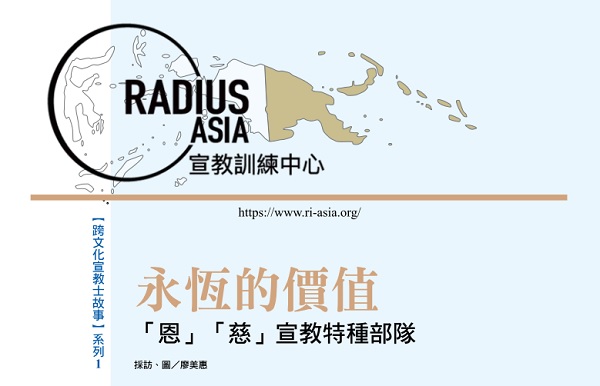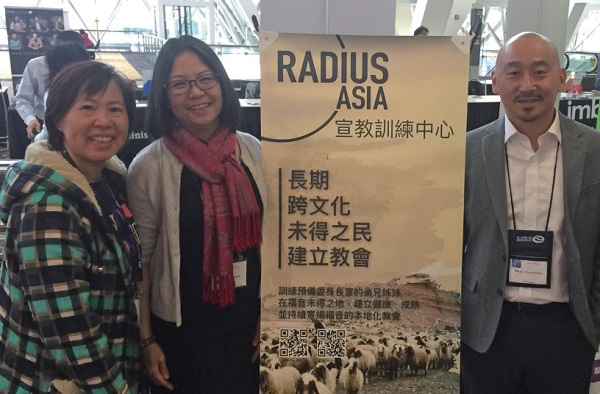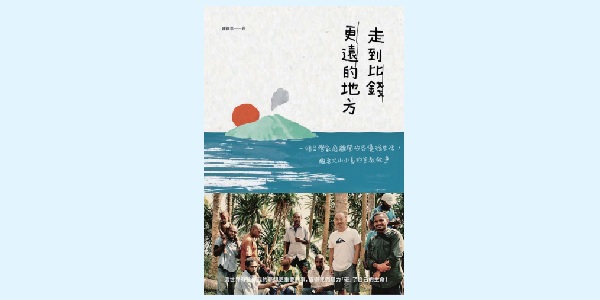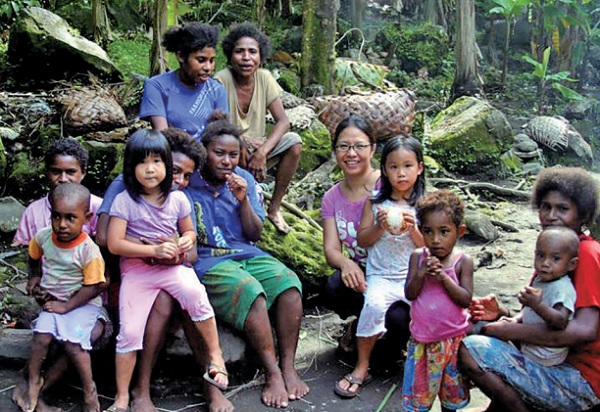eternal value
[Cross-Cultural Missionary Stories] Series 1 "Grace" and "Charity" Missionary Special Forces
Interview, photos/Liao Meihui

At the end of 2019, I attended the CMC Chinese Mission Conference in Baltimore, USA, and took advantage of my free time to visit the booths of missionary organizations. An unfamiliar organization name - "Radius Asia Missionary Training Center" caught my attention. .
"I have never heard of your organization and would like to know more about you."
"What we do is not a general education on global missions, nor is it a provision of courses and resources for brothers and sisters who are committed to missions. Radius focuses on providing a set of courses for brothers and sisters who are ready to make long-term commitments in cross-cultural missions. Effective "pre-departure training".
"So you are a special missionary force!" I blurted out. The lady smiled but didn't answer.
"Why are you willing to work so hard to preach to an island so far away?"
With a firm tone on her face, the woman answered with a smile: "Because He is worth it! Because missions are of eternal value!"

▲At the 2019 CMC Chinese Mission Conference, reporter Liao Meihui (first from left) took a group photo with Chen Weien and Zhang Yuici in front of the booth.
Go further than money
If cross-cultural mission is said to be a special force, then missionary Chen Weien’s family is the “special force among special forces.” The person who talked to me at the booth before was Chen Weien’s wife, Zhang Yuici, a cancer survivor.
I accidentally saw "Going Farther Than Money" by Chen Weien at the book booth of the conference. It describes the missionary story of a Taiwanese family who left the luxurious life in Silicon Valley and moved to a volcanic island. After ten years on the missionary road in a foreign land, it turns out that all these stories begin with "grace" and "compassion" in Banyu.
In 2009, Chen Weien, Zhang Yuici and their two preschool daughters moved their family from Silicon Valley to Biem Island in Papua New Guinea in the South Pacific. The Biem people on the island are one of the country's more than 800 ethnic groups. one. This is a small island with a diameter of three kilometers and a population of only 2,000. It does not have fresh water, electricity, Internet and other civilization products. Access requires a six- or seven-hour sailing. Life is next to the jungle and the sea. "The Pacific Ocean is in front of my house and there are volcanoes behind it" is a reflection of their home!
"What is the most difficult thing you have encountered on the island? What is the biggest challenge?"
Chen Weien said that this question has been asked no less than a hundred times. In fact, it is "a question that I don't know how to answer."
The eldest son contracted malaria at the age of five and had a high fever, and had to fly to Australia by seaplane for treatment; his wife suffered from cancer, his home sank under the sea, he lived only on the sun and water, he learned a language without writing, he was beaten for the first time, and the market was shocked. remember……. Chen Weien said that the biggest challenge and pain should be that as a man, husband and father, he "cannot guarantee" the safety of his family. I have also been questioned, "Is missionary work worth sacrificing your children's lives?"
But Chen Weien asked, how many of the early missionaries had their families experience great suffering because of the gospel? How many children of missionaries are buried in Taiwan?
"Isn't the excessive expectation and love of parents for the next generation the biggest reason for the absence of Chinese Christians in world missions today?!"
In June 2011, after they had finally built a house and their language training was on track, their wife contracted breast cancer and had to return to Taiwan for treatment. Yue Ci was diagnosed with stage 3 breast cancer, and the cancer cells had spread to the lymph nodes. The night before her surgery, she told Wayne, "If God really uses our lives in this way, I think it's a great honor."
After a year of treatment, the family returned to the tribe again. A woman said to Yue Ci: "I don't know what you missionaries are going to say to us, but I believe what you are going to say must be important. Because you are seriously ill and still come back." Since then, they have been working with the local people. There is deeper trust and breakthrough in the relationship between residents.

▲"Going further than money" written by Chen Weien, first edition in March 2019.
"There are many foreigners coming to Papua New Guinea. These people can come to such far places for money. Why don't you Christians want to move to our country for the sake of the gospel?"
Planting the first generation of local churches
The ultimate goal of cross-cultural missions is to establish mature churches that belong to the local ethnic groups. In the afternoon group lecture of the Mission Conference, Chen Weien talked about how to help islanders establish their own local churches.
After years of "emotional battles" with the local islanders, several years of language learning, and three months of gospel courses, the missionaries finally explained the core of the gospel - Jesus' death and resurrection - clearly and completely to the local residents. . After that, the first Christians of the tribe were born.
That day was Friday, September 28, 2012. Chen Weien said that he remembered it so clearly because the chief of the Biemu tribe used a knife to carve the date on the pillar at home that day: 9.28.2012. The chief said that he did not know the year, month and day of his birth, but he knew that the day he accepted the salvation of Jesus was his new birthday.
In the past four years, Chen Weien has been looking forward to the day when there are Christians on the island and can worship God with them; but if missionaries ask them to start gatherings, someone will ask in the future: "Who started this church?" They will definitely do it. Answer: "This is the church started by missionaries."
Chen Weien said in the lecture that in third world countries, foreign missionaries actually have many simple ways to attract local people to come to the church. For example, if you send some tangible gifts on the island, or directly spend money to build a church locally, the number of "Christians" is guaranteed to grow to hundreds in no time. But Chen Weien and the other two missionaries clearly understood that the reason why they were here was not to establish a church that belonged to a certain institution, nor to belong to any denomination, nor to be a church that would always have the brand name of an overseas church.
"We have only one purpose, which is to see the Christians on the island establish a church belonging to the Bemu people."
In Papua New Guinea, Chen Weien saw many examples of missionaries who failed after establishing churches. When the missionaries were still there, there were two to three hundred people attending these churches. Once the missionaries left, it soon became a place where only one or twenty old people and children gathered.
Therefore, in January of the following year after the birth of the first group of Christians at the end of September 2012, Beem Church began to gather.
It took Chen Weien and two other missionary families about 12 years from preparing to move to the island to completing the establishment of the church. Chen Weien said that this time is actually much shorter than he imagined. It was originally expected to take 15 to 20 years.
Someone asked Chen Weien, "Why does your tribal church mature so quickly?" He said that there is no standard answer to this. He also admitted that he made many mistakes during the process. But thank God for His grace and protection. If he had to give a reason for the growth of the church, his answer would be "because of persecution." It turns out that becoming a Christian on the island has to pay a heavy price.

Training future cross-cultural missionaries
After completing his ministry on Bemu Island, Chen Weien's next step was to train future cross-cultural missionaries. In September 2019, he established the "Radius Asia Training Center" in Taichung, Taiwan, with the goal of allowing dedicated people to focus their passion for missions on clear and complete missionary training and actions.
"Missionship is not a temporary passion. Especially for cross-cultural missionary work, language is the first and most difficult level." Chen Weien said that in order to convey the gospel clearly, missionaries cannot make any compromises in language learning. There must be ways to have in-depth conversations with ethnic groups with different cultures and languages. For example, talk about: "What is sin?" "Why can't sinners save themselves?" "Why can't our good deeds earn salvation?" "Why is Jesus the only true God?" and other topics. This is the purpose of his establishment of the "Radius Asia Training Center", to better equip missionaries to go to places where the gospel has not yet reached.
Chen Weien believes that an important step after igniting missionary enthusiasm is "pre-mission training".
Radius is an organization that trains cross-cultural missionaries, not a mission. Its role is to help brothers and sisters who are ready to commit themselves to cross-cultural missions to receive comprehensive cross-cultural mission training before entering missions, so as to reduce the rate of loss of missionaries in the field. He believes that the four core values that cannot be compromised in cross-cultural missions are: the need for language learning, the integrity of evangelism, the need for church planting, and the belief that suffering is the price of fulfilling the Great Commission. "Radius Asia" is a branch of Radius International in Asia, with Chinese as the main language of training.
Radius Asia invites missionaries with experience in cross-cultural missions to teach, training students on how to learn languages and practical life skills in the workplace, to how to preach the full gospel from a worldview perspective, and to build a deep understanding of the world through living together with local people. relationships to bear witness to the Word of God to build mature local churches. Taking practical challenges in the workplace as training and the ultimate goal of building a church as a principle, we equip brothers and sisters who are willing to commit themselves to cross-cultural long-term evangelism to fulfill the Great Commission entrusted by the Lord Jesus.

▲Preacher Zhang Yuici and his two daughters with local women and children of the Biemu ethnic group. (Reprinted from Chen Weien’s mother church, Taichung Flag Church)
Mission: Eternal Value
Undoubtedly, Chen Weien's missionary story is rare in the Chinese missionary circle, but he admitted that when he was in seminary, he was not one of those who were enthusiastic about missions. After the whole family responded to the mission with practical actions, he reminded the congregation on the podium, "If a Christian's life has not been connected with the Great Commission, then he has not yet understood the complete gospel. Jesus clearly promulgated the Great Commission to us, The hymns we sing in the church are about all nations and peoples, but where are our actions? In terms of the call to mission, our obedience to God’s word is far more important than anything else. Mission is a necessary response to the gospel. "
Chen Weien believes that missionary work is not a sacrifice. "From the perspective of brothers and sisters, you may think that my family and I are a group of people who have suffered. Suffering is a tool that God will use to fulfill the Great Commission, but we must change our values, otherwise it will affect our understanding of the Great Commission. Views." He shared that when Yue Ci's cancer returned, the Christian sisters in the tribe no longer felt as sad as when they first heard about her illness. Their values have been updated, and they believe that as long as they fulfill God's commission, a person's life is valuable, no matter how long it is.
At the mission conference, he quoted Paul’s example of always rejoicing in the Lord in times of adversity to encourage the congregation, “Missionship is not a sacrifice and difficult decision, it is not a loss, but a decision that will bear the weight of incomparable glory in eternity. From Paul’s perspective, missionary work is about gaining benefits and rewards in eternity.” Just as Chen Weien carefully thought about what has eternal value, and then “smashed” his life on those things. Even though our eyes cannot see it now, it will be true in eternity.
Finally, Chen Weien encouraged and appealed to Chinese Christian parents at the mission conference: "Will the decision to be a missionary hurt? If your child becomes a missionary, will it hurt in your heart? For Chinese families who immigrate to the United States, if Our pursuit of life, career, family, and dreams is no different from non-Christians, so why should the world stop and listen to what we call "new life"?" He said earnestly, "Are you willing to bless and fulfill us? Will your children be used by God to accomplish great things among all nations and peoples? We must pass on the right vision and worldview to future generations. Are you proud of your missionary zeal and your willingness to follow Jesus? This decision is correct! Beneficial."
After listening to Chen Wei'en's sharing at the mission conference, an elder from the same church sitting nearby said to me softly that Pastor Chen Wei'en's missionary story must be heard by more Chinese, especially the second generation of young Chinese.
"Being a missionary" must be a voluntary and deliberate choice to see Jesus exalted among all nations. “Our sufferings, which are momentary and light, are working for us an incomparable and eternal weight of glory. For we set our sights not on what is seen, but on what is unseen; for what is seen is temporary, but what is unseen is eternal ” (2 Corinthians 4:17-18)
He is worthy of the devotion of many missionary warriors throughout their lives; because missions have such extremely heavy and eternal value.
About Chen Weien
Pastor, missionary. Born in Taiwan, he immigrated abroad when he was young. He has passports from three countries. The place he lived the longest when he grew up was a primitive island in the South Pacific.
After graduating from Gordon-Conwell Theological Seminary in the United States, he and his wife Zhang Yueci pastored the Tri-Valley Chinese Bible Church in San Francisco and had two daughters. In 2007, he joined the New Tribes Mission in the United States. In 2009, he went to serve the Biem (Bem people) in Papua New Guinea in the South Pacific. He integrated into the local residents, learned the local language, translated the Bible, and established a tribal church. Currently Director General of Radius International Asia.
For information about Radius Asia, please visit the websitewww.ri-asia.org
Liao Meihui, graduated from Chinese Evangelical Theological Seminary of North America (CESNA), and is a special writer for this magazine.
